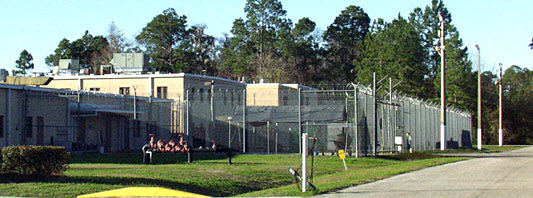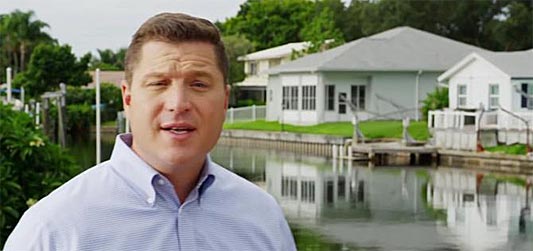Comprehensive 'Florida First Step Act' Could Supplant Many Already-Filed Justice Reform Bills
Posted February 2, 2019 10:45 pm

TALLAHASSEE – Sen. Jeff Brandes on Thursday pre-filed Senate Bill 642, the "Florida First Step Act," which incorporates the “best ideas” from the federal criminal justice reform measure adopted in December by Congress with widespread bipartisan support and the backing of President Donald Trump.
The act is one of approximately 35 bills pre-filed by Brandes, R-St. Petersburg, and one of 736 thus far introduced for the 2019 session, which begins March 5.
 Photo:
Jeff Brandes - YouTube
Photo:
Jeff Brandes - YouTube
SB 642 addresses the sentencing of criminals and focuses on re-entry services to reduce crime, cut probation costs and create “a more efficient, effective criminal justice system,” Brandes said.
As the chairman of the Senate Judiciary Appropriations Subcommittee, Brandes is spearheading the state’s criminal justice reform initiative. SB 642 is his 10th justice reform-related bill pre-filed for the upcoming session.
“Tough on crime” laws imposed in the 1990s have increased Florida’s prison population by 29 percent in two decades. The state – with 96,313 inmates on July 1 – has the nation’s third-largest prison population.
State corrections spending has increased correspondingly, up 60 percent in a decade, from $1.5 billion to $2.4 billion this year. The state’s Department of Corrections’ 2020 budget seeks $330 million in “new” funds – three times this year’s allocation.
Brandes told Watchdog.org in December he will submit bills to address more than 100 mandatory minimum sentencing requirements in state law as one way to trim the prison population by about 10,000, to 86,000.
Included among Brandes’ nine criminal justice reform bills pre-filed before he introduced the "Florida First Step Act" Thursday are SB 406, which would raise the felony-theft threshold from $300 to $1,500; SB 400, which would give judges discretion in sentencing nonviolent drug offenders; and SB 534, which would create a “risk assessment instrument” to bolster supervised bond programs.
SB 534, modeled from Pinellas County’s pretrial diversion program, authorizes the chief judge of each circuit to enter an administrative order for a risk assessment in pretrial release determinations, saving money through electronic monitoring and other tactics rather than jailing those who can’t pay bond.
“It will be a great tool for everybody,” he said. “It will help sheriffs manage jail populations and it will help individuals get back to life quicker.”
Brandes proposed a similar bill in 2018 that did not make it out of committee. Among organizations that resisted that measure and have already registered opposition to SB 534 is the Florida Bail Agents Association (FBAA).
The FBAA maintains the bill would increase costs and offers no data to support claims that bail alternatives save taxpayers money while not allowing violent offenders to “slip through the cracks.”
The FBAA said 32 of Florida’s 67 counties offer pre-trial release. In a study of 29 of those counties, 28 saw a rise in FTAs (failure to appears) and re-arrests among those in the program.
A Roche Surety analysis of Alachua County’s $1.8 million pre-trial diversion program documented that costs increased by 15 percent since 2015, with cost per participant increasing 19 percent in 2017 to $1,665 each. The survey showed only 5 percent of inmates in the 800-bed jail were detained on bonds less than $5,000.
“Jail is extremely fluid,” the report states. “Most defendants, especially non-violent, low level offenses, are arrested, booked, and released very quickly.”
The FBAA opposes pre-trial diversion, Brandes said, since it trims members’ revenue potential, but notes jails – therefore, taxpayers – absorb costs for keeping those who cannot pay bail imprisoned.
Last year, many reform efforts stalled but this year, Brandes said, most proposals are “less controversial,” with the “Florida First Step Act" merely replicating federal reforms at a state level.
“It should be fairly easy for the members of the Legislature to digest and support,” Brandes said, suggesting some may vote for the comprehensive SB 642 before approving independent measures.
Brandes’ efforts were endorsed this week by two former prosecutors recently elected to statewide positions – Attorney General Ashley Moody and Gov. Ron DeSantis.
Moody said during Wednesday’s Associated Press Day at the Capitol that she is reviewing pre-filed reform proposals. “Whether or not I can support specific individual legislation is another question,” she said.
DeSantis praised Brandes for “doing a lot of criminal justice reform,” citing his SB 406 proposal to raise the felony-theft threshold as “something I am open to.”
However, as a former prosecutor who never charged “anyone I didn’t think was guilty,” DeSantis said he’s “not going to skimp on public safety” and will assess reform measures on their potential impact on crime and safety.
Moody said she would do the same.
“People that are a danger to our communities must pay a price,” she said. “In any effort to make our system better, we must always be mindful that we have an obligation to keep our communities safe and protect Floridians. That will always be my primary concern.”
-------------------------------
This piece appeared in the Watchdog.org and was reprinted by the Columbia County Observer with permission or license.
Layout and county detention center added by the Observer: Columbia County Observer photo

 By
John Haughey | Watchdog.org
By
John Haughey | Watchdog.org